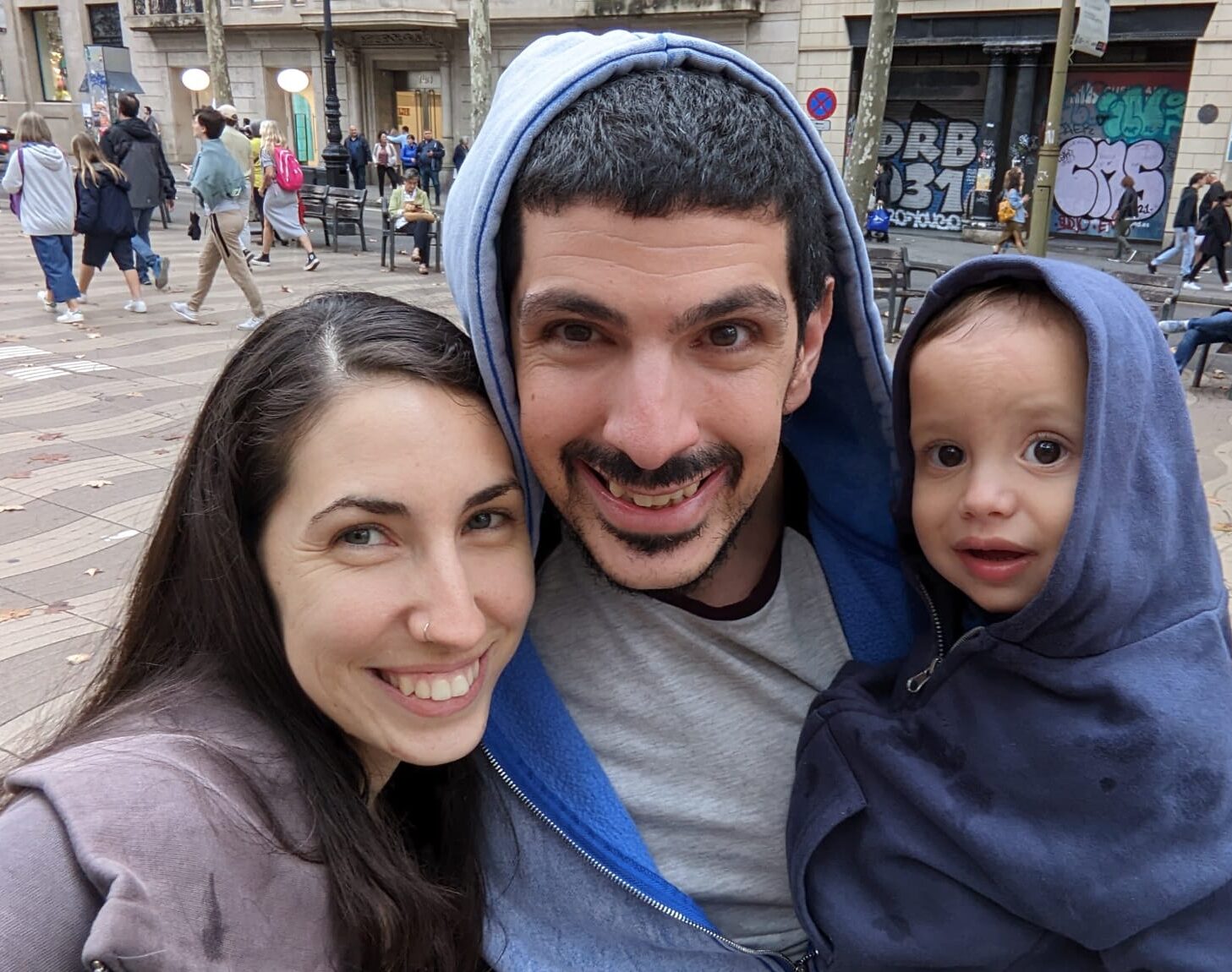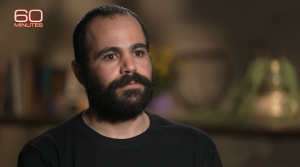Since Oct. 7, Michael Levy has put his life on hold to advocate non-stop for his brother Or, 33, one of the remaining hostages still being held by Hamas in Gaza.
Israeli authorities said this week that 32 of the remaining 136 hostages, or one-fifth of those who remain captive in Gaza, are likely already dead.
On Feb. 6, the day of the news reports indicating further deaths among hostages, Levy confirmed Israeli authorities still have not provided any updates about his brother.
Hamas took 240 people hostage in the attacks on southern Israel that morning that left more than 1,200 dead and sparked Israel’s war on Hamas in Gaza. More than 100 hostages have been let go to date, mostly in coordinated releases of groups of people during a November humanitarian pause in fighting. Israel also released Palestinian prisoners and detainees.
Michael Levy says he hasn’t heard from his brother since Oct. 7, the day Or and his wife Einav, 32, left their two-year-old son, Almog, with his grandparents to go to the Nova music festival.
“They got there… basically [arriving] straight to hell. They got there at 6:20 a.m., when the missile attack pretty much started,” Levy told The CJN in a phone interview from Toronto.
The couple ran into a bomb shelter, normally a safe place during missile attacks that are common in the region.
“But then after a few minutes, a group of terrorists came and started throwing grenades and spraying this shelter with bullets,” he says.
“Or had to witness his wife being murdered in front of his eyes before he was taken into Gaza.
“That’s our lives ever since then,” says Levy.
Einav’s death in the attack was confirmed when authorities identified her body days later.
Or’s last communication to family, at 7:19 that morning, was a text to his mother from a bomb shelter during the attack. “Mom, you don’t want to know what’s going on here,” he wrote.
Family members say two-year-old Almog knows that his mother is never coming back, and cannot hear her name or he will begin to cry and be inconsolable.
Michael’s advocacy for Or and the other hostages’ release, he says, is not political, but humanitarian. He needs to reunite little Almog, who has already lost his mother, with his father
Speaking with The CJN on Jan. 29, Michael Levy said they only know Or was kidnapped alive, and that he was not injured when it happened. Other hostages who have already been released did not report seeing Or Levy, his brother says.
Levy said that along with speaking out and sharing the stories of the hostages’ families, he’d like to see Canadian leaders apply political pressure on Qatar and Egypt, who are in a position to pressure Hamas. But he especially calls out the International Committee of the Red Cross, which has to date not visited the hostages.
“[Canadian leaders and government bodies] can put more pressure on the Red Cross and stop donating to [it], because the Red Cross is not doing anything to help the hostages, and there are a lot of things they can do,” says Levy.
In December, Israeli medical professionals in Toronto led a protest simultaneously with one held in Israel in a worldwide call for the agency to visit the hostages. In another event that same month, people dropped off care packages addressed to hostages at the Toronto office of the Red Cross, to highlight the international group’s lack of action in caring for the Israeli captives.
Levy had been part of hostage family delegations who have travelled to Rome, Lisbon, Northern Macedonia, and New York. He was also at The Hague at the beginning of the case against Israel at the International Court of Justice, where the families of hostages led a demonstration Jan. 11 as the trial began.
“It was powerful, and we got a lot of support from the Israeli Jewish community. They came from all over the Netherlands,” he said.
In his recent Greater Toronto Area visit, Levy was a guest on news channel CP24, and met with provincial elected officials, students at Canada Christian College, and local community and religious leaders.
Levy, along with Maayan Shavit—a Toronto resident who had two cousins taken hostage; one was released and the other, Carmel Gat, remains missing—shared their families’ stories in a downtown Toronto meeting with business leaders that had the room in tears.
Levy’s been part of six hostage family delegations so far, including the recent Toronto trip. He says when he tells his family’s story, everyone understands.
“If they are politicians, if they are leading a country or if they are just people trying to live their life, they all understand I’m talking about my brother, about a real person and not about politics. And that’s why I keep doing it, because I think this is the important part.
“It’s a real person… it’s not related to Israel against the Palestinians or any other political story that people try to tell themselves.”
Levy hasn’t seen very much of his own family in Israel in the last 100-plus days, he says, when advocating for his brother and nephew took over his days and weeks.
“This is my life now. I haven’t worked for a day since Oct. 7. I have three daughters at home that barely see me. I miss them, but I know how important it is, and I have my obligation to my nephew, my brother and my family,” he says.
“So I do it because I think that’s the only way to bring them back, to help get more support and pressure from the world on Hamas to release them and stop committing crimes against humanity.”
He says Canada, as a country that’s proud to support peace, should do what it can to help the civilians and children in captivity and their families. And he says Canada is in a position to help.
“[Canadian leadership] should support innocent civilians and help innocent kids like my nephew that lost his mother and is now without a father because his father is held hostage by monsters,” says Levy.

Einav and Or were friends who were inseparable, and loved to travel to places like Thailand and attend outdoor parties.
“They didn’t do any crime, didn’t hurt anyone. My brother and his wife went to a music festival to celebrate peace and love, and people were kidnapped from their own beds.”
Canadians Alexandre Look from Montreal and Vancouver’s Ben Mizrachi were killed at the music festival.
One of the hostages who was at the festival, Romi Gonen, has Canadian cousins who have advocated for her at Toronto rallies and media events. Maureen Leshem, Gonen’s cousin, told the The CJN Feb. 6 her family has received no news about her from Israeli authorities.
“Not sure if that’s a good or bad thing,” wrote Leshem.
At the Grammy Awards on Feb. 4, Recording Academy CEO Harvey Mason Jr. spoke about the lives lost at the Nova music festival to the strains of a string quartet comprising Israeli, Palestinian and Arab musicians.
“Music must always be our safe space. When that’s violated it strikes at the very core of who we are. We felt that at the Bataclan music hall in Paris. We felt that at the Manchester Arena, in England. We felt that at the Route 91 music festival in Las Vegas,” Mason Jr. said at the music awards show.
“And on Oct. 7, we felt that again when we heard the tragic news from the Supernova music festival for love, that over 360 music fans lost their lives, and another 40 were kidnapped. That day and all the tragic days that have followed have been awful for the world to bear as we mourn the loss of all innocent lives.”
Author

Jonathan Rothman is a reporter for The CJN based in Toronto, covering municipal politics, the arts, and police, security and court stories impacting the Jewish community locally and around Canada. He has worked in online newsrooms at the CBC and Yahoo Canada, and on creative digital teams at the CBC, and The Walrus, where he produced a seven-hour live webcast event. Jonathan has written for Spacing, NOW Toronto (the former weekly), Exclaim!, and The Globe and Mail, and has reported on arts & culture and produced audio stories for CBC Radio.
View all posts








